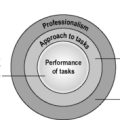3 Being an enthusiastic and passionate teacher
What is a passionate teacher?
The reader of this book will appreciate how important it is for a teacher to have the technical skills necessary to teach students effectively and efficiently – skills such as delivering a lecture, managing small group learning, or preparing an assessment exercise. We will deal with the different skills later in the book, but having only the technical skills is not enough. Good teachers need to demonstrate a passion for their teaching if they are to motivate their students to learn. The passionate teacher conveys an enthusiasm for the subject and for their teaching. Student surveys have found that the ‘master lecturer’ not only presents the subject matter with clarity, but also conveys the content with enthusiasm and excitement. ‘All effective teachers’ suggests Day, ‘have a passion for the subject, a passion for their pupils, and a passionate belief that who they are and how they teach can make a difference to their pupils’ lives, both in the moment of teaching and in the days, weeks, months and even years afterwards’ (Day and Hadfield 2004). The late George Miller described the worst teachers not as those who knew less or taught less but rather as those who were uninterested in their students.
In his book The Passionate Teacher, Fried (2001) argues ‘Only when teachers bring their passions about teaching and life into their daily work can they dispel the fog of passive compliance or active disinterest that surrounds so many students’. He goes on to distinguish passionate teaching from mere idiosyncrasies or foibles. These may make the teacher memorable for their students, but this is different from the passion we are describing. As Whitehead argued in his classic 1929 text The Aims of Education, ‘The University imparts information, but it imparts it imaginatively… A university which fails in this respect has no reason for existence. This atmosphere for excitement arising from imaginative consideration transforms knowledge. A fact is no longer a bare fact: it is invested with all its possibilities. It is no longer a burden on the memory: it is energizing as a poet of our dreams and as the architect of our purposes. Imagination is not to be divorced from the facts: it is a way of illuminating the facts’.
Does it matter?
Does passion matter in teaching? The short answer is ‘yes’. Effective teaching is the result of a combination of many factors but passion is at the heart of what good teaching is about. Teachers’ passion and enthusiasm for their students’ learning is important. Passion and enthusiasm are highlighted in studies of the skills and attributes of excellent teachers. The word ‘passion’ features regularly in students’ descriptions of their best teachers – both the passion teachers have for their subject and the passion they have for sharing their learning with their students. In one study of medical students’ perceptions as to what makes an effective medical teacher, the two highest-ranking attributes selected by both senior and junior students were ‘is passionate about teaching’ and ‘motivates and inspires the students’ (Kua et al 2006). A review of exemplary university teachers found that they enjoyed teaching, showed enthusiasm for their subject, and made an earnest attempt to promote students’ learning (Hativa et al 2001). Passion in teaching is not a luxury or a frill that we can do without – it is the key element in students’ learning. When the quality of students’ learning is compared in different situations, the differentiating factor is frequently found to be the passion of the teacher – more than their knowledge of subject matter, more than the teaching strategy adopted, and more than the learning technology incorporated.
Everyone can be a passionate teacher
Here are suggestions, some taken from the work of Fried, that may help:
• Think about how in your teaching you can share your enthusiasm for your subject with your students.
• Let your students see that you are working in partnership with them to support their learning and not just as an expert standing aloof.
• Think back to the teachers who you most respected and learned from when you were a student. What was it about their teaching that inspired you?
• Think about the aspect of your work as a teacher that gives you the greatest satisfaction. Could you develop this further?
• Don’t be surprised if you come across cynics who will try to damp your enthusiasm. Expect to hear comments like ‘You’ve only got a short time to teach on the subject so don’t get carried away’ or ‘Your ideas will never work as there are too many students in the class’ or ‘We don’t have enough resources for you to do that’. Keep in mind that most obstacles put in your way are surmountable.
• Create an appropriate learning environment that manifests interpersonal warmth, empathy, support for students’ self esteem, patience and a sense of humour.
• Care for and have a keen interest in the development of your students and feel responsible for their success and for their intellectual and moral well-being.
• Have a deep commitment to provide the best opportunities for each student based on their individual needs. Think about the potential of each student for whom you are responsible and how you might build on their individual strengths.
• It helps to be enthusiastic about your teaching if you are familiar with the curriculum, how your own teaching fits in, and why some topics are given more weight than others. (This can guard against your passion for teaching being stifled or frustrated when you find that the time allocated for your subject has been reduced.)
• Serving on a curriculum committee or course planning team gives you an added insight that you will find helpful.
• If you teach in the context of an integrated or problem-based curriculum, you may find that you have less control over what is taught, and may have to conform to the set teaching strategies. Understand that these approaches have potential advantages and can play an important part in the students’ learning.
Reflect and react
1. Recognise that much can be achieved by teachers who love to teach and by students who want to learn.
2. Remember that there is no place for teaching by humiliating and patronising students, but there is a place for teachers who demonstrate a passion for their teaching.
3. Are you considered by your students and colleagues to be a passionate teacher, filling them with enthusiasm for your subject? Consider whether with benefit you could adopt some of the strategies outlined above.
4. Are you fully committed to the performance of each student and to the extent to which they are achieving their individual potential? Do students perceive you as someone who is there to help and support them?
Hativa N., Barak R., Simhi E. Exemplary university teachers. Knowledge and beliefs regarding effective teaching dimensions and strategies. The Journal of Higher Education. 2001;72:699-729.
A review of the attributes of effective teachers.
Kua E.H., Voon F., Hoon C., et al. What makes an effective medical teacher? Perceptions of medical students. Med. Teach.. 2006;28:738-741.
A short description of the evaluation by students of what makes an effective teacher in medicine.
Day C., Hadfield M. A Passion for Teaching. London: Routledge; 2004.
A description of the importance of being a passionate teacher, and what is required.
Fried R.L. The Passionate Teacher: A Practical Guide. Boston: Beacon Press; 2001.
Whitehead A.N. The Aims of Education and Other Essays. New York: The Free Press; 1929.







